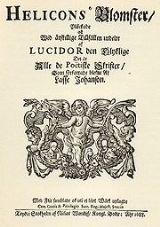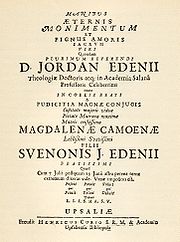
Lucidor
Encyclopedia

Carl Michael Bellman
was a Swedish poet and composer. Bellman is a central figure in the Swedish song tradition and remains a very important influence in Swedish music, as well as in Scandinavian literature in general, to this day....
, and for his dramatic death in a tumultuous brawl at the Fimmelstången tavern in Gamla stan in Stockholm. Lasse Johansson wrote under several different pseudonyms, but of these "Lucidor" (or "Lucidor den olycklige", "Lucidor the Unfortunate", as he called himself on occasion) is the one under which he is commonly known today.
Lars Johansson was born in Stockholm
Stockholm
Stockholm is the capital and the largest city of Sweden and constitutes the most populated urban area in Scandinavia. Stockholm is the most populous city in Sweden, with a population of 851,155 in the municipality , 1.37 million in the urban area , and around 2.1 million in the metropolitan area...
. His father was a naval officer and his grandfather was admiral Lars Strusshielm, who was appointed head of a Swedish naval shipyard in Pomerania
Pomerania
Pomerania is a historical region on the south shore of the Baltic Sea. Divided between Germany and Poland, it stretches roughly from the Recknitz River near Stralsund in the West, via the Oder River delta near Szczecin, to the mouth of the Vistula River near Gdańsk in the East...
in 1638. A few years later, Strusshielm's daughter and son-in-law followed him to Pomerania, where Lars Johansson and his four siblings grew up. Both parents were dead by 1650, and the grandfather died in 1653. Lasse spent four years, from 1655 to 1659 at the university of Greifswald
Greifswald
Greifswald , officially, the University and Hanseatic City of Greifswald is a town in northeastern Germany. It is situated in the state of Mecklenburg-Vorpommern, at an equal distance of about from Germany's two largest cities, Berlin and Hamburg. The town borders the Baltic Sea, and is crossed...
and from early 1659 at the university in Leipzig
Leipzig
Leipzig Leipzig has always been a trade city, situated during the time of the Holy Roman Empire at the intersection of the Via Regia and Via Imperii, two important trade routes. At one time, Leipzig was one of the major European centres of learning and culture in fields such as music and publishing...
, where he was expelled just before Christmas 1659, after a brawl with the town guards. His biography during the following years is unclear, but he travelled to France
France
The French Republic , The French Republic , The French Republic , (commonly known as France , is a unitary semi-presidential republic in Western Europe with several overseas territories and islands located on other continents and in the Indian, Pacific, and Atlantic oceans. Metropolitan France...
, possibly as a tutor, and is said to have lived in poverty in Stockholm. He may have spent time with a travelling group of comedians, and is reported to have returned to Stockholm with these in 1668. During the winter 1668/69, he was enrolled as a student in Uppsala
Uppsala
- Economy :Today Uppsala is well established in medical research and recognized for its leading position in biotechnology.*Abbott Medical Optics *GE Healthcare*Pfizer *Phadia, an offshoot of Pharmacia*Fresenius*Q-Med...
, but appeared to have spent his time there as a language tutor for students; an appointment as a teacher of modern languages fell through.
A significant part of his modest income appears to have come from writing occasional poetry
Occasional poetry
Occasional poetry is poetry composed for a particular occasion. In the history of literature, it is often studied in connection with orality, performance, and patronage. As a term of literary criticism, "occasional poetry" describes the work's purpose and the poet's relation to subject matter...
for weddings and burials. One piece brought him in trouble: "Giliare Kwaal" ("A suitor's sufferings"), a poem for the wedding in November 1669 of the powerful nobleman Conrad Gyllenstierna to Märta Christina Ulfsparre. Lucidor had previously written a well-received poem for the wedding of Conrad's brother Christoffer Gyllenstierna. "Giliare Kwaal", however, was received as libel by Conrad Gyllenstierna, who reported the author to Svea hovrätt, the appeal court. The poet was arrested and spent several months in prison until the process was finally at an end in the summer of 1670. Neither the town court in Stockholm nor the appeal court found the poem libellous, but the sentence still warned the poet to "use his pencil more carefully hereafter". The Lucidor scholar Stina Hansson explains the problems with the poem in that the author did not follow the conventions for which motifs were conventional for addressee of a particular social standing, and had broken the rules by using a style more suitable for occasional poetry in a bourgeois setting. After his run-in with the Gyllenstierna, Lucidor became much more careful in exactly following the conventions in this respect.
Lucidor's best remembered poem, the ballad "Skulle Jag sörja då wore Jag tokot" ("If I would mourn, I would be crazy") is traditionally said to have been written during his time in prison.
Lucidor was killed in a duel with a Lieutenant Arvid Christian Storm.
Three of Lucidor's religious songs were published in 1685 under the name "Lucida intervalla", edited by Haquin Spegel
Haquin Spegel
Haquin Spegel , born Håkan Spegel in Ronneby in south-east Sweden, was a religious author and hymn writer who held several bishop's seats.- Life :...
. These remained part of the hymn book of the Church of Sweden into the 20th century. In 1689, Johan Andersin, an accountant who had been a friend of Lucidor, published a collection of his poetry with the title "Helicons blomster/ plåckade ok wid åtskillige tillfällen utdelte af Lucidor den olycklige", subtitled "det är alle de poëtiske skriffter som författade blefne af Lasse Johanson".
"Helicons blomster" was republished in 1835, and a new collection including some additional poems was published in 1865. Modern editions have been published by Fredrik sandwall in 1914-30 and by Stina Hansson in 1997.
Lucidor was not highly appreciated in the 18th century, but Carl Michael Bellman is known to have been familiar with Lucidor and refers to him and Runius together in one of his "Epistles of Fredman" (No 24):
- Jag skull' supa om ni tror,
- Liksom Runius, Lucidor.
The interest in Lucidor was re-awakened in the romantic period. The main authors influencing the image of Lucidor were Per Daniel Amadeus Atterbom
Per Daniel Amadeus Atterbom
Per Daniel Amadeus Atterbom was a Swedish romantic poet, and a member of the Swedish Academy....
, Oscar Levertin
Oscar Levertin
Oscar Ivar Levertin was a Swedish poet, critic and literary historian. Levertin was a dominant voice of the Swedish cultural scene from 1897, when he started writing influential high-profile essays and reviews in the daily paper Svenska Dagbladet...
and (in the early 20th century) Erik Axel Karlfeldt
Erik Axel Karlfeldt
Erik Axel Karlfeldt was a Swedish poet whose highly symbolist poetry masquerading as regionalism was popular and won him the Nobel Prize in Literature posthumously in 1931. It has been rumored that he had been offered, but declined, the award already in 1919.Karlfeldt was born into a farmer's...
.
In the late 20th century, Lucidor has been the topic of a novel by Torbjörn Säfve.
The musicologist and musician Martin Bagge (who is also known as an interpreter of the works of Bellman) has published a collection of Lucidor's poems with musical annotation, and a CD recording them. It has been known that many of Lucidor's poems were written to be sung but no melodies have been preserved. Assuming that Lucidor borrowed melodies popular in his time (as many other poets of the time, and later Bellman, did), Bagge has attempted to reconstruct the music by matching the metrics with religious hymns and other songs with which the poet would have been familiar.

